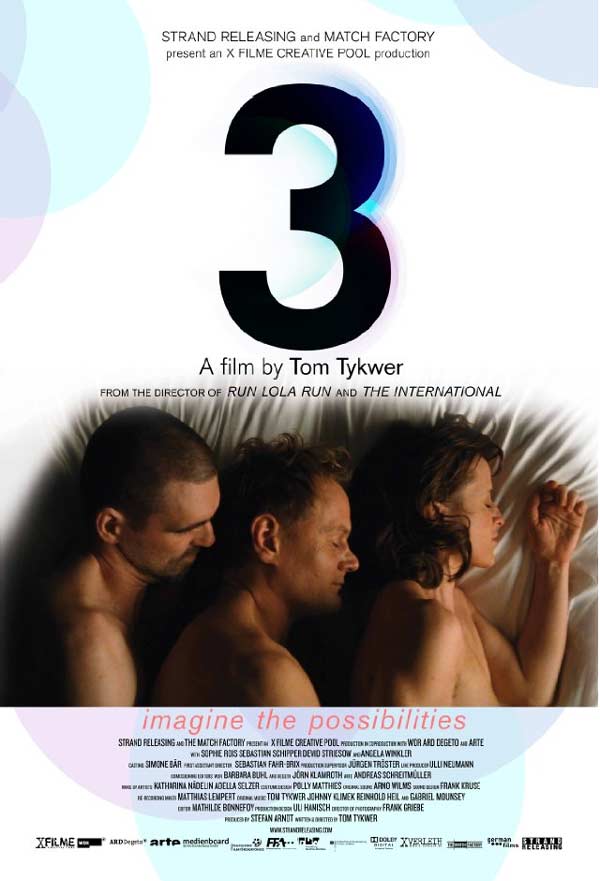The art-house just keeps shining in 2011. Thank God, because
Hollywood has been awful for the most part this year. "Drei" (Three)
is the next wonderful film on the art-house circuit.
From Germany's Tom Tykwer, one of the most original
filmmakers in the world (you've GOT to see his under-rated 2006 film
"Perfume: The Story of a Murderer"), comes an exploration of modern
relationships, particularly with regard to bisexuality. More and more people
are exploring bisexuality, and Tykwer is right there exploring this quintessential 21st-century development.
There's no doubt in my mind that in the year 2100 most
people in the Western world will consider themselves bisexual. People perhaps
will look back at "Drei" as a harbinger of this. Tykwer is a true artist,
in the sense that he has his finger on the pulse of evolution. He senses where
we are going, and that's what interests him. In many ways, I think of artists
as people several decades ahead of the rest of the population, sending
us postcards from the future. This is certainly the case with Tykwer.
***********************
In "Drei" we meet a happy, well-educated
heterosexual couple approaching the age of 40. One is successful in the arts
and the other in science. (One of the exhilarating aspects of "Drei"
is how it captures the excitement of 21st-century science, particularly
biology.) By pure happenstance, the husband and wife on separate occasions both make the acquaintance
of a male scientist, and each strikes up a friendship with him. Quite quickly, the wife starts having an affair with him. But the big surprise is that the husband, despite having been straight his whole life, starts falling for this man as well.
Pretty soon this scientist, without realizing it, is having an affair with a woman and the woman's husband! For quite a long time, none of the three realizes the bizarre triangle that has formed.
Pretty soon this scientist, without realizing it, is having an affair with a woman and the woman's husband! For quite a long time, none of the three realizes the bizarre triangle that has formed.
Eventually, the truth is revealed. The scene where the three
individuals simultaneously learn the truth is powerful. You can see the
earth-shattering humiliation and confusion in all three characters. Just trying
to contemplate the breadth of what each must have been thinking
and feeling in that moment stretches the mind and heart.
It's especially interesting to contemplate what was happening
for the husband. He was the only one going through an evolution of his
sexual orientation. (The scientist had long ago established a bisexual lifestyle.) Unfortuantely, Tykwer glosses over this a bit. In fact,
each character is reticent and doesn't say much about what is going on in their
minds. We have to rely on the actors' faces to glean clues about the inner
lives of the characters.
One nicely written scene involves the husband trying to
figure out how to describe himself after the intensity of his same-sex
attraction becomes clear. He gets tongue-tied trying to use the word
"gay" to describe himself in a way that's quite affecting. One can
really feel for him.
I won't reveal the ending, but it is interesting. The film
slightly cops out in the end, presenting the characters as so open-minded as to
be unrealistic. But still, there is so much food for thought in
"Drei." The direction, furthermore, is expert.
Tykwer directs with near-effortless charm and cogency. Every scene zips along
elegantly and with real heart. The editing, cinematography, and writing are so good sometimes that it gives one goosebumps. This film is a joy.


No comments:
Post a Comment